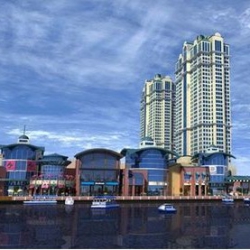The Pennsylvania Gaming Control Board approved a second Philadelphia gaming license earlier this month. The decision seconds a November 12 approval for the casino gaming license by the Delaware County Council.
Stadium Casino LLP
The holder of the license is Stadium Casino LLP. Stadium Casino intends to develop a casino at 900 Packer Avenue, which currently is home to a Holiday Inn on the southside of Philadelphia.
The license is the sixth and final of the promised casino licenses in eastern Pennsylvania and the fifth of those promised for the Philadelphia metropolitan area.
About the Stadium Project
Stadium Casino LLP is operated by the Cordish Companies of Baltimore and Greenwood Gaming & Entertainment Inc. of Bensalem, Pennsylvania. After the Gaming Control Board issued its license, it published a 172-page report on its decision. The main theme of the report was the “synergy” between a casino on the southside and the 8 million sports fans and music enthusiasts who visit 400 events per year in the Philadelphia area.
Stadium Casino LLP was one of four companies in the running for the license. The field was narrowed down in some cases because applicants (like Penn National Gaming) pulled out, wondering whether the northeastern casino market was saturated.
Bob Green Sees Market Expansion
Greenwood’s chairman, Bob Green, spoke to local media about his company’s competition outspoken fears about saturation of the market and whether a new casino would simply draw-off customers from other local gaming establishments, a process called “cannibalization”.
In a gaming board hearing at the Pennsylvania Convention Center in Philadelphia, Mr. Green said, “There will be some cannibalization, but I think the market will expand generally. We believe that there is a significant untapped source of revenue” in the southside or stadium district of Philadelphia.
Not the Same as Atlantic City
Opponents of the new casino have pointed out that Atlantic City has seen 5 casinos close this year, so no new gaming venues should be built. Those against the Stadium Casino fail to note that Atlantic City is on the coast, hours away from Philadelphia and New York City. As more casinos were built closer to those population centers, Atlantic City had trouble luring visitors to their resort destination. That’s a major reason why New Jersey’s leaders are discussing the building of a North Jersey casino.
Pennsylvania’s neighbors have had to deal with the rise of gaming in that state. A decade ago, the state hardly had a land-based gaming industry, so those gamblers went out of state. They mainly stay in-state these days, hurting the industry in nearby locations. Pennsylvania is the 6th-most populous state in the USA. It can sustain a larger casino industry, which is why it is 2nd in the United States in gaming revenues and 1st in the US in gaming-related taxes. With 8 million people in the wider metropolitan area, a southside casino should be able to attract gamblers and expand the region customer base of gaming enthusiasts.
Modeling Games for Players
One example of a casino which expanded the community, instead of stealing customers from rivals, is the Sands Bethlehem. The Las Vegas Sands Corporation has made significant inroads in the Asian gaming market over the past ten years. It’s Venetian Macau and Sands Macau are among some of the most profitable casinos in the entire world. LVS has learned how to market to gamblers from the Asian culture.
What the Sands Bethlehem did was encourage Asian-Americans from New York City to frequent their casino through marketing, game selection, and arranging greater convenience. The Sands Bethlehem designed a huge a gaming floor for baccarat, the favorite game for Asian mass market players and high rollers. Then the company arranged for 50 busloads of Asian-American New Yorkers to ride out to the casino each week. Soon, the Sands Bethlehem had the largest revenues in Pennsylvania casinos, while the other casino operations continued on with their traditional numbers.
As fewer slot machines players continue to play the slots, the gap in revenues increased. The Sands Bethlehem was not stealing those customers, though. LVS simply predicted the future gaming market better, then tailored their gaming floor to reflect their vision. The owners of the Stadium Casino in Philadelphia should attempt to find their own signature demographic. It doesn’t have to be the same one the Sands Corp chose, but it needs to integrate marketing, game selection, and accommodations.

